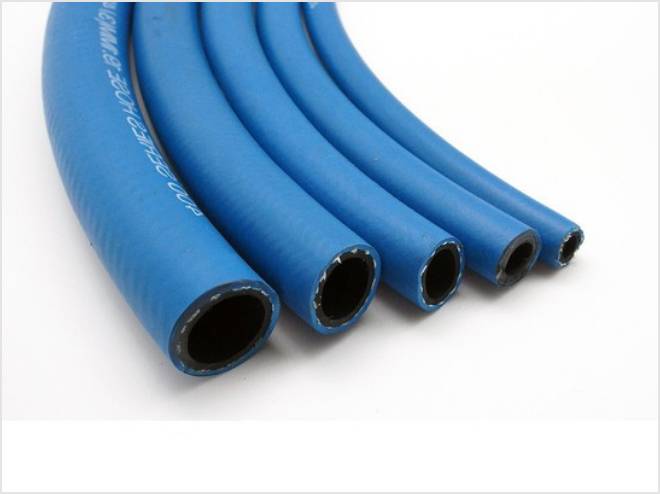Synthetic Rubber Hose Widely Used Of Its Elasticity And Toughness
Synthetic rubber is rubber manufactured by a chemical process from petroleum and other chemicals rather than the product of raw rubber extracted from a natural rubber tree.
Synthetic rubber is any type of artificially made polymer material which acts as an elastomer. An elastomer is a material with the mechanical property that it can undergo much more elastic deformation under stress than most materials and still return to its previous size without permanent deformation. Synthetic rubber serves as a substitute for natural rubber in many cases, especially when improved material properties are needed.
Natural rubber breaks down when exposed to oil, which spells frequent maintenance for natural rubber used in tires and in motor parts. The synthetic rubber holds air 13 times better than natural rubber and is excellent at resisting aging, weathering, chemicals, moisture, ozone, extreme temperatures and tearing.
Synthetic rubber, because of its elasticity, resilience, and toughness, rubber is the basic constituent of the tires used in vehicles, aircraft and bicycles. The same properties make synthetic rubber useful for machine belting and all kinds of hoses. Synthetic rubber is also used in electrical insulation. Because of its waterproof, it is a favored material for shoe soles.
We use the products made of rubber in different places at different times i.e. at play, at work, at home in vehicles and even when we travel. The expanded use of motor vehicles, and particularly motor vehicle tires, created increased demand for rubber. Synthetic rubber is more in use than natural rubber and accordingly, more in demand. Subsequently, it needs to be produced in ample quantities and hence, there are many manufacturers in the world who are producing and supplying synthetic rubber to the extensive group of needy customers.
The history synthetic rubber holds a number of experiments that were carried out to obtain high quality synthetic rubber. It can be produced only at the manufacturing plants by synthesizing it from petroleum and other minerals. Synthetic rubber can act as an elastomer, which is a substitute to natural rubber. The products made from synthetic rubber sheets, like mouse pads, adhesive tapes, tire, gloves etc., possess different chemicals, depending on which, they are either as soft as sponge, as resilient as a rubber band or as hard as a bowling ball. This artificial rubber can be used in plumbing fixture and laboratory tubing.
Synthetic products whose properties are similar to those of natural rubber, including elasticity and ability to be vulcanized; usually produced by the polymerization or copolymerization of petroleum-derived olefinic or other unsaturated compounds.





